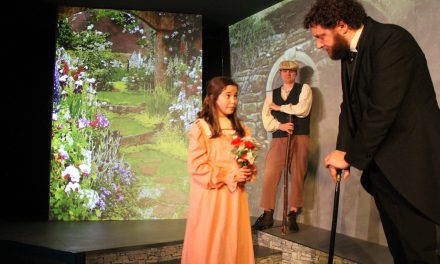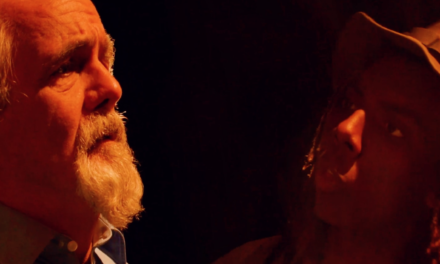| The cast of A Hanukkuh Christmas with Klurman and Goldstein. Photo courtesy of Bunbury Theatre. |
Written and directed by Juergen K. Tossmann
Reviewed by Cristina Martin
Entire contents copyright © 2011 Cristina Martin. All rights reserved.
’Tis the season, all right. Holiday-themed productions proliferate at this time of year like snowflakes at the North Pole. For anyone inclined to take in one or more, the choice can be difficult: Should it be a classic? A contemporary piece? A musical? A mystery?
For those looking for a very funny new show “written to entertain and enlighten,” in the words of playwright and director Juergen K. Tossmann, Bunbury’s A Hanukkah Christmas with Klurman and Goldstein is a good bet. Lighthearted yet thought-provoking, it resonates with everyone – whether they celebrate Hanukkah, Christmas, both, or neither.
Klaus Klurman and Hyman Goldstein are the mainstays of two previous plays by Tossmann. While characters and relationships developed in these are mentioned, A Hanukkah Christmas is perfectly understandable without having seen its precursors. With just a few explanations that aren’t the least bit tiresome, Tossmann manages to make it entirely clear who’s who, no small feat given that the connection between characters can be rather unconventional and complicated. And they’re nothing if not a diverse bunch: gathered together to celebrate “Hanukkah Christmas” are two elderly, cantankerous Jewish men (Klurman and Goldstein are played by Matt Orme and Tossmann himself, respectively); the kindhearted non-Jewish daughter-in-law of one of them (Angela Roberts Goldstein, played by Cathy Butler-Weathersby); a plain-spoken relative from eastern Kentucky (Fred, played by Mike Burmester); a transgender cousin of the Kentucky relative (Al/Alice, rendered believably by Dale Strange); and the very conservative African-American Reverend Felix (Sherrick O’Quinn) and his wife, Twilight (Jamisa Spalding).
At the heart of it all is the irrepressible eponymous duo. You’ve got to see and hear Klurman and Goldstein for yourself to appreciate them fully. Whether they happen to be momentarily peevish, impish, childish, or outrageously politically incorrect, they’re appealing because they are who they are, with no apologies. Klurman, who was an actor and director in Europe as a young man (he starred in a film called Hitler Does the Tango (!)), declaims and pontificates accordingly, while Goldstein, once an accountant by profession, is less comfortable in his own skin and envies his friend’s flair for comedy. Matt Orme’s Klurman is magnificent in everything from accent to body language; I had to pinch myself to remember he wasn’t one of my elderly relatives from Central Europe. Many actors only dream of inhabiting a role so authentically. Juergen Tossman delivers a strong performance as well, though his accent vacillated on opening night and he seemed a bit distracted (billed as Producing Artistic Director, Playwright, Director, and Hyman Goldstein – I can’t imagine why!).
As the play opens, Goldstein is hanging a dreidel on his “Hanukkah tree.” When Klurman enters and remarks that his friend happens to be particularly crotchety, Goldstein explains that Christmas is an angst-filled time of year for him, one that makes him feel particularly “conflicted”… Why this is the case, we find out later, has to do with more than just his being Jewish. I had to smile as the light dawned: Waiting for the show to begin, I couldn’t help but notice the exceptionally schmaltzy, cloying arrangements of holiday music being played at full volume. The songs got on my nerves more and more such that by the time I met Goldstein, I could relate entirely to his annoyance with all things Christmas, and I’m actually one who does celebrate the holiday! What a brilliant touch.
Klurman and Goldstein are amusing when they trade insults with one another, and they’re even funnier when they play off the eclectic group of extended family members who come to dinner.
Butler-Weathersby is so sweet and accommodating as Angela – who has taken Klurman and Goldstein into her home and now hosts this party – that I thought the woman must be a saint. We discover, however, that there are one or two things that get under her skin. Mike Burmester is hilarious as old hippie Fred, who isn’t exactly the sharpest tool in the shed and walks around rather bemused most of the time. When Goldstein is confused by Fred’s use of “y’all,” Klurman explains to Goldstein that Fred is from the South. “From the South?” Goldstein replies. “What is he, a Sephardic Jew?” He figures “Yal” is the man’s name and persists in using it as such, making for some great moments of comedy.
Judging by his portrayal of Al/Alice, Dale Strange has done an impressive study of how women move and hold themselves. Al/Alice’s sometimes exaggerated mannerisms get good laughs. We laugh with her rather than at her, however; she’s eminently likable because she has worked so hard to achieve self-acceptance and is unapologetically who she is.
Also instantly likable is Twilight. Jamisa Spalding emanates a refreshing openness coupled with an absolutely infectious laugh. As her dogmatic husband, Sherrick O’Quinn is downright scary. O’Quinn is a relative newcomer to the local theatre scene, but with the stage presence he demonstrates, he’s sure to make a name for himself.
Pacing was a bit slow at times, but this can most likely be explained by opening night tentativeness. One remarkable aspect of the direction was the blocking, which seemed natural and dynamic throughout. Klurman and Goldstein never left their wheelchairs, yet these were never encumbering or distracting.
The play’s humor is sometimes simple (recurring gags involve stinky cheese, intestinal gas, and the spiking of the punch bowl) but sometimes gives a viewer real pause. What to make of Goldstein calling Klurman “gay” in a mocking tone, singing a song about a Southern “Mammy,” or saying during a major hullabaloo that it “sounds like a shiksa (non-Jewish woman’s) wedding”? You can be insulted; or, as is intended, you can laugh at the ignorance and inaccuracy of the stereotypes. What to do about someone so seemingly unenlightened at nearly 90? You’re probably not going to get him to change his attitudes overnight. So do you just tolerate him?
The redeeming quality of Goldstein is that he actually knows better. He’s open to seeing people for the individuals they are. In fact, one of the people dearest to him in all the world was of a different race and sexual orientation. The word he and this person used as a term of endearment for one another can be taken as an unconscionable insult by someone else. So the sentiments behind the terms we use give them their true meaning, although the sentiment is not always evident behind the baggage the term carries.
“Happy Holidays” is a phrase Klurman and Goldstein both hate, maybe because it seems to have checked any and all baggage at the door. While they scoff that there’s no such thing as “Hanukkah Christmas” when Fred first says it, that becomes exactly what they celebrate in the end. Instead of blending into something bland, these quirky characters learn to live with each other despite their quirks, and in certain cases, to realize that they’re not so different after all. Twilight puts it well when she bursts out in delight, “Your family is just as dysfunctional as mine!”
One question kept nagging at me as I sat before Angela’s understated but stylish living room. Did that orange-colored armchair and ottoman actually match the bold pattern on the couch or not? Would I put this combination in my own house? Depending on the light, my opinion wavered. After debating a bit I realized, What does it matter?? They’re coexisting in the room just fine even if they’re not precisely the same and even if Martha Stewart were to declare the combination crazy. Some may favor one over the other, but fundamentally, both are good spots to park your tuckus. What a good lesson for Hanukkah Christmas.
A Hanukkah Christmas
with Klurman and Goldstein
December 2-18, 2011
at the Henry Clay
604 S. Third St.
Louisville, KY
(502) 585-5306
www.bunburytheatre.org




